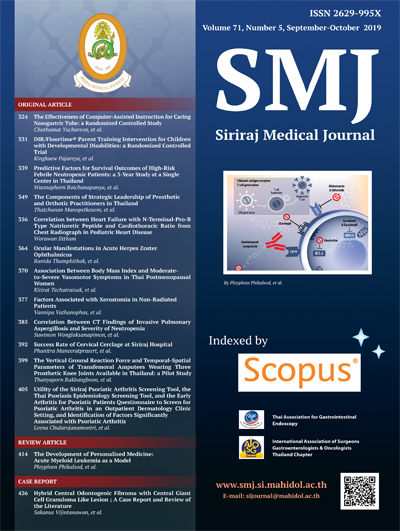Association Between Body Mass Index and Moderate-to-Severe Vasomotor Symptoms in Thai Postmenopausal Women
DOI:
https://doi.org/10.33192/Smj.2019.56Keywords:
BMI; VMS; postmenopausal women; ThaiAbstract
Objective: Body mass index (BMI) has been controversially reported to be positively, inversely, or not associated with vasomotor symptoms (VMS) in postmenopausal women. This study analysed the association between BMI and moderate-to-severe VMS in Thai population.
Methods: A cross-sectional study was conducted among 178 Thai postmenopausal women aged 30-60 years. They were categorized into two groups by BMI. The two groups (normal BMI <25.0 kg/m2 and high BMI ≥25.0 kg/m2) were compared. Modified menopausal rating scale (MRS) was used to assess the severity of VMS. The association between BMI, types and duration of menopause, and VMS were analyzed by chi-square test and t-test analysis. Multiple logistic regression analysis was used to evaluate the associations between BMI, other variables, and severity of VMS.
Results: Each group comprised 89 consecutive postmenopausal women. The percentage of women with moderate-to-severe VMS was significantly higher in the normal BMI group than in the high BMI group (60.9% vs 39.1%, respectively; p= 0.007). The association between normal BMI and moderate-to-severe VMS was statistically significant after adjustment for other confounding variables that included age, medical illness, duration or type of menopause and current medications (adjusted odd ratios [OR]: 2.378; 95% confidence interval [CI]: 1.273, 4.447).
Conclusion: Interestingly, Thai postmenopausal women with a normal BMI experience a higher rate of moderate-to-severe VMS than those with a high BMI. The finding indicates that BMI is a risk factor for VMS among Thai postmenopausal women. Healthcare providers should focus on normal BMI Thai postmenopausal women when assessing for and treating VMS.
Downloads
Published
How to Cite
Issue
Section
License
Authors who publish with this journal agree to the following conditions:
Copyright Transfer
In submitting a manuscript, the authors acknowledge that the work will become the copyrighted property of Siriraj Medical Journal upon publication.
License
Articles are licensed under a Creative Commons Attribution-NonCommercial-NoDerivatives 4.0 International License (CC BY-NC-ND 4.0). This license allows for the sharing of the work for non-commercial purposes with proper attribution to the authors and the journal. However, it does not permit modifications or the creation of derivative works.
Sharing and Access
Authors are encouraged to share their article on their personal or institutional websites and through other non-commercial platforms. Doing so can increase readership and citations.















